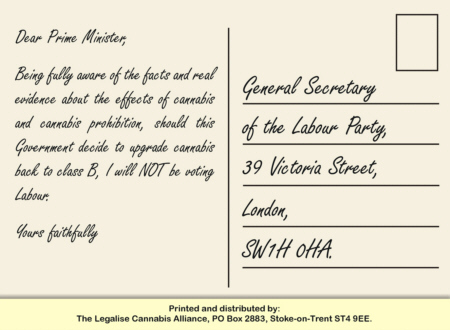Mr Walker apparently told the House of Commons "young people "playing Russian roulette" with their lives through the use of skunk cannabis." In this Mr Walker (MP for Broxbourne) reveals his ignorance in many ways.
Firstly "skunk" cannabis is just one of a huge number of varieties and it's strength, like all cannabis, depends upon how it is grown.
Mr Walker also wrongly claims that cannabis today is the drug had changed over the last 30 years and was now was "highly toxic and highly dangerous".
The truth was revealed by Kings College, London, about a year ago, when after studying the strength of cannabis, reported that it has not changed.
As for toxicity, clearly Mr Walker does not know the meaning of the word, for the truth is that it is impossible for a human being to consume the toxic dose, which is measured in kilos.
As for playing Russian roulette, Mr Walker ought to be ashamed of himself to make such a comparison - I would happily challenge him to stand by his words, him with a gun loaded with one bullet, me with a massive bag of his so-called "skunk".
Alun Buffry
Norwich
sent in reply to
Newmarket Journal, 13 June 2011
http://www.newmarketjournal.co.uk/news/regional/cannabis_russian_roulette_warning_1_2762093
Cannabis 'Russian roulette' warning
A Hertfordshire MP has warned of a major public health risk with young people "playing Russian roulette" with their lives through the use of skunk cannabis.
Introducing the Commons adjournment debate, Charles Walker (Conservative, Broxbourne) said the drug had changed over the last 30 years and was now was "highly toxic and highly dangerous".
He called on the Government to do more adding: "We can't talk about harm reduction - we have to talk about harm prevention.
"Up and down the country too many families are suffering the torture of watching their children squander their futures - bright children who have so much to live for ending up with so little.
"This is brought about too often by an addiction to skunk cannabis, a drug that is ruining lives."
The drug, he said, created a sense of euphoria, but had many side-effects including hallucinations, delusions, paranoia, attention impairment and emotional impairment.
He said: "Child and adolescent mental health services across this country are dealing with thousands of youngsters and adolescents who are suffering severe psychotic illnesses and there is a causal link with skunk cannabis."
Mr Walker said one in four carried a faulty gene for dopamine transmission and if a youngster had that gene and smoked skunk cannabis they were six times more likely to get a psychotic illness.
He added: "Skunk cannabis is like holding a loaded revolver to your head and playing Russian roulette. You don't know if you have the gene and you don't know when the bullet will fire."
Responding to Mr Walker's concerns, Health Minister Anne Milton pledged to do all she could to protect the health of young people, and acknowledged that skunk cannabis was on average four times stronger than herbal cannabis.





